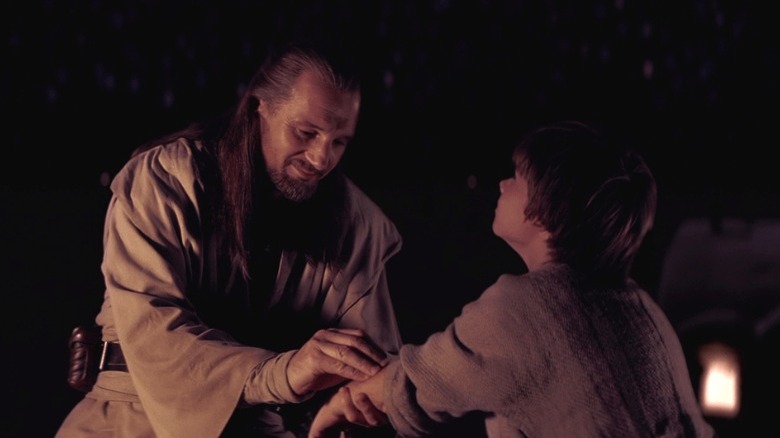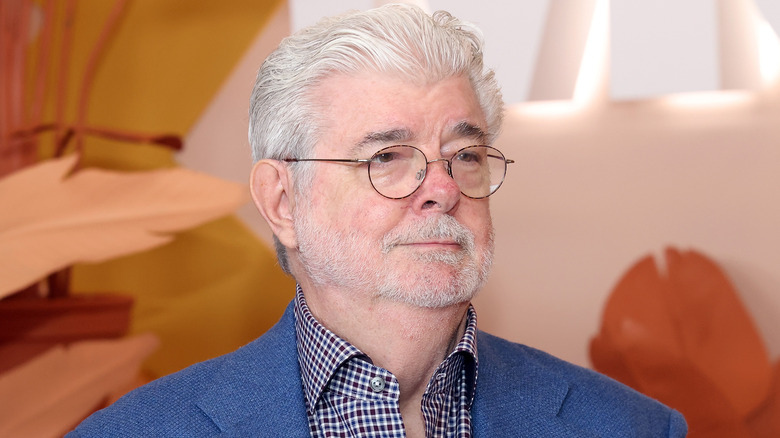Star Wars: Midi-Chlorians Explained & Who Could Have The Most
Since the day the first movie arrived in 1977, the Force has sat at the center of the "Star Wars" franchise. It's a mysterious yet ever-present element of the "Star Wars" universe that binds all living things together and gives the Jedi and Sith incredible powers. For the most part, the Force hasn't been explored too thoroughly in the canon outside of broad descriptions and revelations about what it's capable of. Although, we do know that it's not some magical thing that's incapable of measurement and study. This all boils down to one controversial George Lucas creation: midi-chlorians.
Introduced in 1999 via "Star Wars: Episode I – The Phantom Menace," midi-chlorians are microscopic organisms found in all living things in the "Star Wars" universe. They allow the Force to flow through them, hence why they're so important. Depending on the number and one's sensitivity to the Force, they can result in the ability for an individual to use the Force. It's revealed in the aforementioned film by Qui-Gon Jinn (Liam Neeson), upon running a blood test, that Anakin Skywalker (Jake Lloyd) has the highest known midi-chlorian count in the galaxy with well over 20,000. Thus, Jinn theorized that he could be the prophesized "Chosen One."
While one would imagine that midi-chlorians would be an often-discussed element of the "Star Wars" universe, they've been largely ignored over the years. Overall, "Star Wars" fans don't care much for them.
Midi-chlorians have drawn the ire of Star Wars fans for years
In the years following their "Phantom Menace" debut, midi-chlorians have become a hot topic among "Star Wars" fans. Some don't mind them, though they've also become a source of outrage for many in the fandom. In hopes of getting to the bottom of why midi-chlorians are so controversial and have been since 1999, one curious Redditor opened a thread on the topic. In response, folks came out in droves to explain why they or people they know find them to be more of a nuisance than a welcomed addition to the "Star Wars" canon.
"The fact that ones ability in the force is due to a blood count, really takes away from a lot of the OT aspects about believing in the force, and makes it more of a genetic bloodline trait or anomaly," commented u/Xy13, claiming that midi-chlorians detract from the more spiritual elements of the Force introduced in the original "Star Wars" trilogy. Many others in the comment section echoed similar sentiments, while u/Hudathan added that midi-chlorians are an "unnecessary middleman" when it comes to our understanding of the Force. They don't really add anything to the mythology behind it.
Midi-chlorians could've been the focus of the Star Wars sequel trilogy
Following the completion of the "Star Wars" prequel trilogy, it seemed that the franchise had finally said goodbye to the big screen. George Lucas' cinematic vision had been completed...or had it? Before Lucas elected to sell Lucasfilm and "Star Wars" to Disney, which resulted in a new film trilogy, big and small screen spin-offs, and more, he had an idea in mind for a new set of films. Although, it would've looked much different than the six movies that came before it since it would've shone a spotlight on midi-chlorians and creatures known as the Whills.
Lucas explained in an interview with fellow director James Cameron, "There's this world of creatures that operate differently than we do. I call them the Whills. And the Whills are the ones who actually control the universe. They feed off the Force." These microscopic beings and their relationship with the Force and midi-chlorians would've been the focus of Lucas' next trilogy, but this idea never came to fruition. As Lucas admitted, he heard the negative response to midi-chlorians loud and clear, concluding, "A lot of the fans would have hated it, just like they did 'Phantom Menace' and everything, but at least the whole story from beginning to end would be told" (via IndieWire).
It stands to reason that midi-chlorians will remain a hotly-debated part of "Star Wars" lore forevermore, but regardless of anyone's feelings about them, they're a part of the universe all the same.


